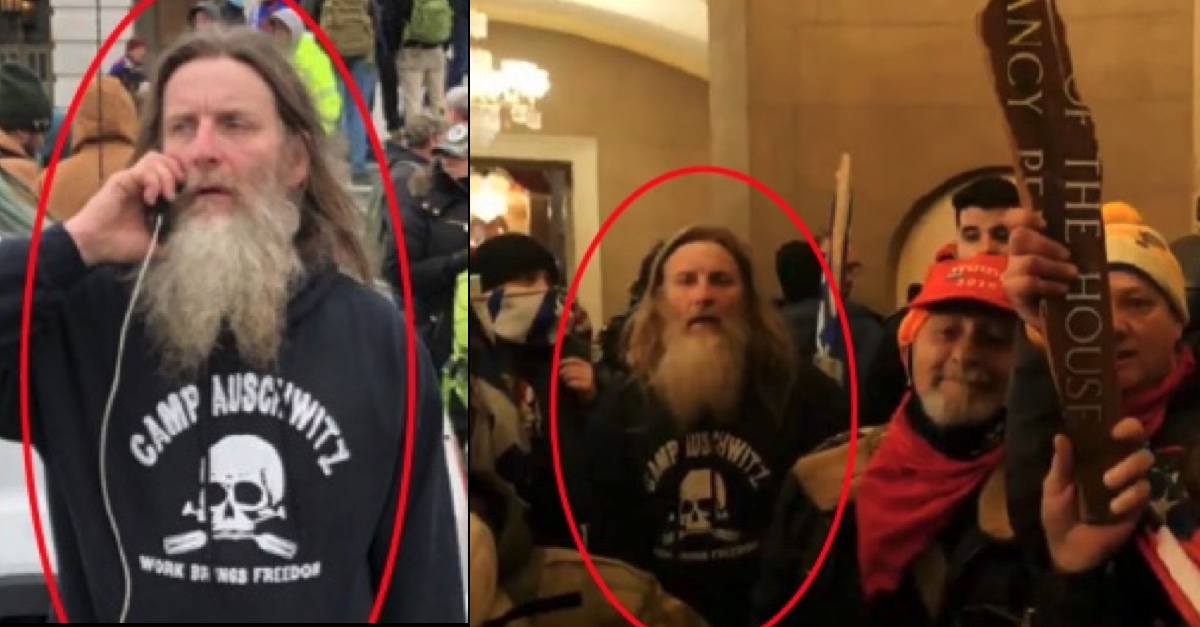
Robert Keith Packer is pictured inside the U.S. Capitol wearing a “Camp Auschwitz” hoodie. (Images via FBI)
A U.S. Capitol rioter who wore a “Camp Auschwitz” sweatshirt mocking the genocide of Jewish people during the Holocaust has been sentenced to jail time in connection with his Jan. 6-related misdemeanor.
Virginia man Robert Keith Packer’s hoodie ridiculed the mass slaughter in the style in the style of a summer camp: The crossbones of the skull resemble the oars of a boat, and the slogan “Work Brings Freedom” is the English translation of the German phrase found in signs above Nazi concentration camp: “Arbeit Macht Frei,” meant to mislead Jews and other persecuted groups into believing they would be released, rather than slaughtered by the regime.
The Nazi regime murdered six million Jews during the Shoah, killing roughly 1.1 million in the Auschwitz death camp alone.
Since he was never tied to violence or property destruction, Packer’s single count of conviction carried a maximum six-month sentence, and prosecutors sought a term of 75 days of imprisonment. That is the term that the judge imposed.
U.S. District Judge Carl J. Nichols, a Donald Trump appointee, noted that the sweatshirt was “incredibly offensive.”
“It seems to me that he wore that sweatshirt for a reason,” Nichols said.
He also pointed to the need to deter attacks like the one Packer joined.
“An exceedingly light sentence here might not deter future rioters,” Nichols added.
The judge said that federal law does not give him the power to impose “split sentences” on the offense, meaning that he could not issue an additional term of probation.
“When People Show You Who They Are, You Should Believe Them”
On Jan. 6, 2021, Packer joined the pro-Trump mob inside the U.S. Capitol building without authorization, but authorities did not tie him to any physical acts of violence or property destruction. He ultimately pleaded guilty to a single count of parading, demonstrating, or picketing inside a Capitol building, but his clothing made him a symbol of the documented presence of bigots, anti-Semites, white supremacists and Nazi sympathizers among the rioters.
For Assistant U.S. Attorney Mona Furst, Packer’s case recalled the expression: “When people show you who they are, you should believe them.”
According to the government’s sentencing memo, when FBI agents asked him why he wore the sweatshirt, Packer “fatuously” replied “because I was cold.” Furst had some words for his Nazi-themed apparel, both visible and not previously seen by the public, on that day.
“He posted his beliefs on his sweatshirt,” Furst noted, adding that she recently learned that he wore an SS T-shirt under it.
Packer was photographed next to other rioters proudly displaying a broken nameplate from the office of House Speaker Nancy Pelosi (D-Calif.), a target of many of Trump’s followers on that day.
As Law&Crime previously noted, a contemporaneous news report also observed Packer with a group that moved toward the office of Senate Majority Leader Chuck Schumer (D-N.Y.), who is Jewish.
Though Packer was not accused of perpetrating violence, the prosecutor said: “Mr. Packer was everywhere where violence happened, except for the Rotunda and the East Doors.”
She noted that Furst wanted to stop the transfer of power to usher in “dictatorial” rule in the United States.
“Could Be Considered in Poor Taste”
In his sentencing filing, Packer’s attorney Stephen Brennwald compared his client to Forrest Gump, a “man who went through life almost as if he was outside of his body and mind, looking in.” The fictional character known for improbably finding himself at major historical events is named after Nathan Bedford Forrest, a Confederate general who was also the first grand wizard of the Ku Klux Klan.
Brennwald said that comparison earned him ire from fans of the Tom Hanks movie from around the world, and he said his client would not speak on his behalf to avoid being quoted by such a wide audience.
Alluding offhandedly to the “nature of the offensive shirt” his client wore, Brennwald depicted Packer as the victim of an overreaction.
“He was also hounded by the press for many days, and images of his face and shirt were broadcast over various news outlets repeatedly over the days and weeks following January 6, 2021,” the defense sentencing memorandum states.
Brennwald was more direct in his in-court statement: “There is no question that the shirt is offensive.”
Calling the shirt “awful,” Brennwald said that it would be inappropriate for his client to face a heavier sentence because of it under U.S. law, where he has a First Amendment right to wear it. The attorney noted that Packer would not have had that right in Germany, which banned Nazi symbols.
In a letter to the court, Packer’s younger sister Kimberly Rice minimized the incendiary and bigoted nature of her brother’s “sweatshirt — yes a sweatshirt.”
“Yes, it could be considered in poor taste just as much as so much more is these days, but it’s not a crime for freedom of expression,” Rice wrote, attributing the outrage by her brother’s Holocaust-ridiculing apparel to the “news media.”
Despite the bigoted apparel he wore, Packer claimed to take offense by being associated with the ideology it signifies.
“He told me he was offended when he was called a white supremacist,” Brennwald said, adding his client asked him to sue Pelosi for identifying him as one.
The prosecution noted that Packer was remorseless, expressing grievance rather than regret.
“It’s all about what happened to him,” Furst said.
Packer’s pre-sentencing report contained 17 pages devoted to his prior criminal history, mostly but not exclusively for motor vehicle violations.